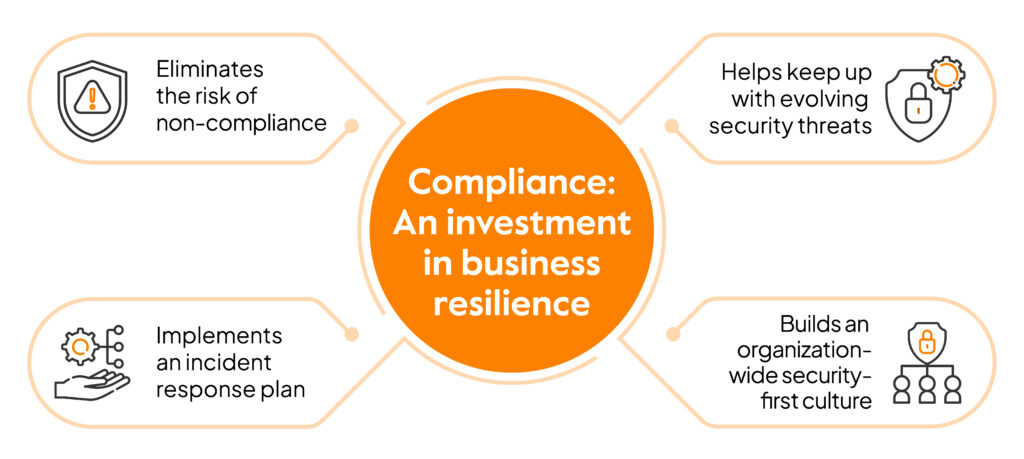By Girish Redekar, CEO & co-founder at Sprinto
As the world creates more data and accesses more networks, cybercriminals are finding new vulnerabilities and piling onto the long list of security risks. So, whether you are just starting up or have an established business, if you aren’t constantly enforcing security best practices to protect yours and your customers’ data, you are setting yourself up for failure.
Failing to implement strong security measures can have serious consequences, including data breaches, loss of customer trust and confidence, financial losses, and damage to reputation. Ensuring data security is critical for any business that consumes and processes data.
In far as information security goes, while there is no clear line on how much security is good enough, infosec compliance makes a good starting point.
Compliance as a security starting point
In today’s connected world, your organization’s security posture is only as strong as your information network’s weakest link (think, vendors). Case in point: the SolarWinds hack.
Compliance certifications and attestations are a trusted way to demonstrate your security status and that of the many organizations in your supply chain. It also demonstrates that you have the capacity to manage and respond quickly to security incidents and that you are prepared to meet and manage business risks and uncertainties.
And this is why compliance works.
Demonstrates your commitment to security
By obtaining a compliance certification, you show that you take data security seriously and are committed to meeting the industry’s best practices and high-security standards set by professional accreditation bodies.
Improves credibility and reputation
A compliance certification helps you build credibility with customers, partners, and regulators, as it shows that you have been independently evaluated and found to meet specific standards.
Reduces risk
When you comply with the high-security standards defined by various frameworks, you reduce your security risks and bring down the anxieties of vendors, partners, and customers in your supply chain.
Facilitates business
In some cases where compliance certifications are required by law (for instance, GDPR, FedRAMP and HIPAA) or are a prerequisite for doing business, obtaining a compliance certification can help attract new business and grow in geographies and segments that are compliance conscious.
Compliance certifications make for an excellent and verifiable security, reliability, and trust proxy. And that they improve your credibility, reputation, and risk management efforts only add to its benefits.
When should you get compliant?
Yesterday! But since that’s not possible, it is a good idea for businesses to start thinking about information security compliance as early as possible. Infosec compliance should be part of your products and services’ planning and development process. When you give infosec a seat at the growth table, you ensure that security gets built into the foundation of your business and that appropriate controls are in place from the start.
Be that as it may, there is always time to implement strong information security practices. These include conducting risk assessments to identify potential vulnerabilities, implementing appropriate controls and safeguards, and regularly reviewing and updating security measures to ensure they remain effective. Or you could do it all as part of the information security requirements per the compliance(s) you choose.
So, it adds up to this.
Understand your threat landscape
The threat landscape constantly evolves, and attackers continuously find new ways to bypass security measures. As a result, organizations with strong security practices are also vulnerable to cyber-attacks.
You can significantly reduce the risk of a data breach by implementing strong security practices and staying up-to-date with the latest security technologies and techniques.
Know your regulatory roadmap
Be aware of relevant industry regulations or standards that may apply to your business, including familiarizing yourself with data protection, data privacy, and cybersecurity laws. Doing this can help you improve your data protection, stand out against the competition, and avoid potential fines or penalties.
Recognize that cloud security isn’t enough
Data security cannot be assumed when stored or transmitted in the cloud. While cloud providers generally have robust security measures to protect their infrastructure and services, you are still responsible for ensuring that data is appropriately encrypted, access is controlled and monitored, and applications are correctly configured.
Compliance: An investment in business resilience
Here’s the thing. It is impossible to eliminate the risk of a data breach! But comply, you must, for it’s the foundational security layer, the basic minimum that you must build on. Compliance forces you to proactively take measures to fend off security risks by preparing you for the worst.

Eliminates the risk of non-compliance
Noncompliance is the single biggest reason to get compliant! You may be more vulnerable to attacks when noncompliant with applicable security regulations and standards. This can result in the loss or theft of sensitive data, which can have severe financial, legal, and reputational consequences for your organization.
Helps keep up with evolving security threats
Security compliance regulations and standards often get updated in response to evolving security threats. For example, PCI DSS 4.0 was updated a year ago to feature crucial user and system access authorization and authentication upgrades. In another instance, ISO 27001 requirements were recently updated to reflect the evolution in technologies and industrial practices such as threat intelligence, information security for cloud services, and data leakage prevention.
Maintaining your compliance certifications, dovetails (at the minimum) evolving technological changes and security risks and adds to your project readiness.
Implements an incident response plan
Compliance can help you implement an effective incident response plan by providing a clear framework for planning and management, identifying potential vulnerabilities, and administering due diligence.
Most compliance standards such as SOC 2 compliance, include incident response planning and management requirements.
Builds an organization-wide security-first culture
Your compliance with infosec frameworks can help build a security-first culture by setting clear expectations, providing staff security training and awareness, and encouraging a risk-aware mindset.
This helps seed data security and compliance at the architecture and operational levels and ensures that data is protected at all levels of the organization.
Compliance Automation & Management: The way forward
Compliance is a lot of work, requires extensive documentation, and can eat away hundreds of productive hours of your key engineering hires. Fortunately, there’s a simple solution. Compliance automation.
Thanks to automation, compliance management is easier now than ever. Instead of spending your precious time working with consultants, maintaining multiple versions of spreadsheets, and keeping an evidence repository, you can automate it all.
With compliance automation, you can streamline compliance-related processes, improve visibility into your compliance status, and promptly identify and address potential risks. Automating compliance saves time and resources, enhances accuracy, and reduces the risk of non-compliance. And it doesn’t break the bank either!
So whether you are a small business or an established one, compliance automation is the way to build infosec resilience, improve operational efficiency, and ensure continuous compliance.
Girish Redekar is a 2X founder, currently the CEO & co-founder at Sprinto – a smart security compliance automation platform for ambitious cloud companies who want to move fast and win big. Before Sprinto, Girish co-founded RecruiterBox – an applicant tracking system for small businesses (later acquired by Turn/River capital).
.
.
Follow Brilliance Security Magazine on Twitter and LinkedIn to ensure you receive alerts for the most up-to-date security and cybersecurity news and information.


